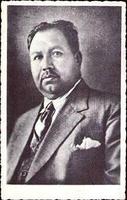Farrukhi Yazdi

Farrukhi Yazdi, Mirza Muhammad (1888- murdered in 1939), son of Ibrahim. Born in Yazd, he received his education at the English missionary school and learned Persian and Arabic literature in traditional schools in his hometown. He composed poetry at the age of 15 and was interested in the political developments of Iran; as a consequence, he was expelled from school, following which, as a member of the middle class laborers, he had to work at the age of 16. He composed a musammat on the New Year’s Day of 1872 and recited it at a session held by the Democrats of Yaz, in which he alluded to the tyrannical governor of his hometown, Za’im al-Dawla Qashqa’i whose wrath he incurred. The governor ordered that his mouth be sewn and be jailed. Consequently, the freedom seekers and democrats staged a sit-in at the telegraph office and communicated a telegram to the parliament and the officials, urging the deputies to impeach the minister of interior who denied the incident. It was at the insistence of the public and a report by the deputy of Maragha that Za’im al-Dawla was summoned. Za’im al-Dawla stated that he had punished Farrukhi for his impudence. A lithograph report of the crime was published. Farrukhi fled from confinement after a month or two, Za’im al-Dawla was dismissed from his office, and Hajj Fakhr al-Mulk was appointed the governor of Yazd who offered him solace. Farrukhi emigrated to Baghdad and Karbala’ at the outbreak of World War I, but he was persecuted by English agents, as a consequence of which he went to Mosul on foot, heading towards Iran. Upon his arrival, he was jailed for long time by the tsarist army. Caucasians attempted to assassinate him, but he had a narrow escape. He opposed the 1919 Agreement under the premiership of Vuthuq al-Dawla, as a consequence of which he served a long time in jail. He was also imprisoned at Sardar I’timad’s garden under the premiership of Sayyid Ziya’ al-Din Tabataba’i. He died a mysterious death, seemingly by empty injection. His activities in the post-constitutional era included his membership at the Democratic Party. He published the Tufan newspaper in 1921 which continued to appear for eight years notwithstanding closedowns. Accompanied by some other people, Farrukhi traveled to the Soviet Union after the October Revolution at the invitation of the Soviet government and stayed there for eleven years. Upon his return he resumed the publication of the Tufan, but it was closed down and his travelogue serials ceased to appear. Finally, he traveled to the Soviet Union and Berlin, where he contributed articles to Paykar. Having been condemned by the Iranian Embassy in Germany for his contributions to Paykar, he published the Nahzat periodical there, though it was ephemeral and his harsh articles led to his deportation from Germany. He returned to Iran at the suggestion of Taymurtash, but he was apprehended after a while and was jailed. The He entered the political arena following the Constitutional Revolution and composed critical and political poetry which repeatedly led to his persecution and imprisonment. He represented the city of Yazd at the National Consultative Assembly in 1928. He was one of the most distinguished of ghazal poets in Iran at that time. His political ghazals are unrivalled in Persian literature. Although he was not highly educated, but his poetry is more vigorous than his contemporaries. He poetry is serious and critical, reflecting his ideas for which he was prepared to sacrifice his life. He made every attempt in his poetical compositions to urge Iranians to rise against all exploiting forces. His interest in classical forms led to the popularity of his poetry in which he most passionately defended the underprivileged, laboring classes of the society. He was a competent and patriotic journalist and poet passionately defending his sacred love for freedom. His divan of poetry includes very fluent and innovative compositions. His political quatrains are on a par with Khayyam’s philosophical and mystical quatrains. Thanks to his vigorous talents, he could compose a delicate ghazal in no time. He mainly improvised the ghazals which he published in the Tufan.
Tarikh-i Jara’id wa Majallat (3/ 168-186); Tadhkara-yi Sukhanwaran-i Yazd (631-643); Sukhanwaran-i Nami-yi Mu’asir-i Iran (4/ 2632-2637).
 In association with The Iran Heritage Foundation © All rights reserved 2025. Jane Lewisohn | Website by
In association with The Iran Heritage Foundation © All rights reserved 2025. Jane Lewisohn | Website by